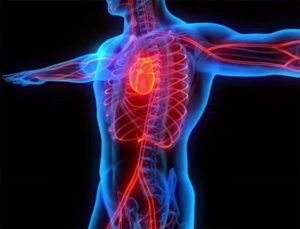Copyright © 2025 Open Medicine Foundation. All Rights Reserved.
This Harvard study evaluates the different explanations of heart preload failure in ME/CFS patients to determine which is active in many, if not all, ME/CFS patients. The Computation Center is now seeking to better understand the causes of ME/CFS (PLF, the high flow type) as well as to identify potential drug targets for future therapies.
Using a biorepository of plasma from more than 300 patients with ME/CFS, investigators have identified a form of heart failure or “Preload Heart Failure” (PLF). It presents in two forms: low flow and high flow. Many of these patients suffer from dysautonomia and many have had the diagnosis of postural orthostatic tachycardia syndrome (POTS), a syndrome that involve both the cardiopulmonary and the peripheral vascular systems as they are modulated by the autonomic nervous system.
Why these systems become dysregulated causing the dizziness, fatigue, inability to exercise, lightheadedness, fainting, and sometimes fast heart rate, nausea, anxiety, and blurred vision is not known. It is likely that intense study of the interaction of these systems will lead to a much better understanding of the origin of this dysregulation.
It is the hope these studies in ME/CFS patients undergoing cardiopulmonary exercise testing will expand the biorepository and lead to better understanding of the causes of ME/CFS (PLF, the high flow type) as well as to identify potential drug targets for future therapies.

Analyze data collected throughout the study.
Identify metabolomic, proteomic, and inflammatory marker differences in the blood of patients with preload heart failure and a diagnosis of ME/CFS.
OMF is a non-profit 501(c)(3) organization
(EIN# 26-4712664). All donations are tax-deductible to the extent allowed by law.



Open Medicine Foundation®
29302 Laro Drive, Agoura Hills, CA 91301 USA
Phone: 650-242-8669
info@omf.ngo
Copyright © 2025 Open Medicine Foundation. All Rights Reserved.
What are the advantages of giving from your Donor Advised Fund (DAF)?
How do I make a donation through my DAF?
Just click on the DAF widget below. It is simple and convenient to find your fund among the over 900 funds in our system.
Still can’t find your fund?
Gifting of Stock
Broker: Schwab
DTC #: 0164
Account #: 47083887
Account Registered as:
Open Medicine Foundation
29302 Laro Drive
Agoura Hills, CA 91301
Please speak to your personal tax advisor and then email or call OMF at 650-242-8669 to notify us of your donation or with any questions.